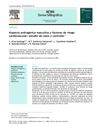 10 citations,
April 2018 in “Maturitas”
10 citations,
April 2018 in “Maturitas” Excess male hormones in postmenopausal women can cause health issues and increase the risk of heart disease and diabetes; treatment depends on the cause.
 3 citations,
July 2022 in “Indian journal of dermatology, venereology, and leprology”
3 citations,
July 2022 in “Indian journal of dermatology, venereology, and leprology” Patients with alopecia areata have higher oxidative stress and lower antioxidant levels.
 5 citations,
February 2019 in “BioMed Research International”
5 citations,
February 2019 in “BioMed Research International” Acne in reproductive-age women may be linked to conditions like PCOS and lifestyle factors, so doctors should check for these when treating acne.
 17 citations,
May 2012 in “Clinical Endocrinology”
17 citations,
May 2012 in “Clinical Endocrinology” Surgery to lower high testosterone in postmenopausal women with certain ovarian tumors doesn't significantly affect their metabolism.
 7 citations,
March 2011 in “Hormone and Metabolic Research”
7 citations,
March 2011 in “Hormone and Metabolic Research” Certain gene variations might help protect against insulin resistance and glucose intolerance in people with Polycystic Ovary Syndrome.
 10 citations,
November 2015 in “Plant Foods for Human Nutrition”
10 citations,
November 2015 in “Plant Foods for Human Nutrition” Hibiscus petals helped control blood sugar and improve liver and pancreas health in diabetic rats.

Metformin helps manage weight, blood pressure, and hormonal imbalances in PCOS patients.
 July 2015 in “Egyptian Journal of Dermatology and Venereology”
July 2015 in “Egyptian Journal of Dermatology and Venereology” People with androgenetic alopecia, both men and women, are more likely to develop heart diseases in the future.
 1 citations,
April 2021 in “Deneysel ve klinik tıp dergisi/Journal of experimental and clinical medicine”
1 citations,
April 2021 in “Deneysel ve klinik tıp dergisi/Journal of experimental and clinical medicine” Women with PCOS have a higher risk of metabolic syndrome and need lifestyle changes and treatment.
 15 citations,
August 2017 in “Scientific Reports”
15 citations,
August 2017 in “Scientific Reports” Young men with early hair loss have slightly worse blood sugar and fat levels, suggesting possible health risks and need for monitoring.
 162 citations,
April 2016 in “The Lancet Diabetes & Endocrinology”
162 citations,
April 2016 in “The Lancet Diabetes & Endocrinology” Testosterone therapy in transgender men has both desired effects like increased muscle mass and potential health risks such as higher cardiovascular risk.
 28 citations,
March 2009 in “Clinical and Experimental Dermatology”
28 citations,
March 2009 in “Clinical and Experimental Dermatology” There is no significant link between male pattern baldness and insulin resistance.
 23 citations,
April 2010 in “Actas Dermo-Sifiliográficas”
23 citations,
April 2010 in “Actas Dermo-Sifiliográficas” Men with early-onset baldness have a higher chance of heart disease and clogged arteries.
 September 2024 in “Journal of the American Academy of Dermatology”
September 2024 in “Journal of the American Academy of Dermatology” Early-onset male baldness may increase the risk of metabolic syndrome.
 20 citations,
November 1968 in “The Lancet”
20 citations,
November 1968 in “The Lancet” Potassium levels affect blood sugar and insulin during dialysis, and malnutrition changes children's hair roots.
 May 2015 in “Journal of the American Academy of Dermatology”
May 2015 in “Journal of the American Academy of Dermatology” Certain drugs and supplements may contribute to hair loss in the frontal hairline in older women.
 January 2024 in “Srpski arhiv za celokupno lekarstvo”
January 2024 in “Srpski arhiv za celokupno lekarstvo” Long-term diabetes, smoking, and poor blood sugar control increase the risk of artery disease in diabetic retinopathy patients.
May 2022 in “The Journal of Clinical Pharmacology” Metformin reduces certain hormone levels in men with early-onset hair loss.
182 citations,
January 2000 in “Drug Development Research” Ethosomal carriers improve drug delivery through the skin better than traditional methods.
1 citations,
February 2024 in “Diversity” African plants can treat hair issues and may help with diabetes.
 May 2023 in “Journal of Cosmetic Dermatology”
May 2023 in “Journal of Cosmetic Dermatology” Being overweight can cause or worsen skin problems in children, some more common in darker skin, and is often linked to insulin resistance.

Early-onset baldness is linked to genetics, lifestyle, and can indicate higher risk for heart and metabolic diseases, and affects mental health.
 815 citations,
April 2010 in “The Journal of Clinical Endocrinology & Metabolism”
815 citations,
April 2010 in “The Journal of Clinical Endocrinology & Metabolism” Women with PCOS should be screened for heart disease risk and manage their health to prevent it.
 1 citations,
January 2024 in “NPJ breast cancer”
1 citations,
January 2024 in “NPJ breast cancer” Experts agree on how to manage sugar levels and skin reactions in patients taking the cancer drug alpelisib.
 August 2024 in “Archives of Dermatological Research”
August 2024 in “Archives of Dermatological Research” Androgenetic alopecia may be linked to metabolic syndrome.
 4 citations,
March 2020 in “BMC Research Notes”
4 citations,
March 2020 in “BMC Research Notes” Skin tags in obese individuals may indicate higher cardiovascular risk.
 3 citations,
January 2020 in “Indian Dermatology Online Journal”
3 citations,
January 2020 in “Indian Dermatology Online Journal” Skin problems in patients with polycystic ovarian disease are linked to body weight, blood sugar, and hormone levels.
 December 2024 in “Journal of Education Health and Sport”
December 2024 in “Journal of Education Health and Sport” Too much sugar harms skin, causing wrinkles and acne, but a low-sugar diet can help.
October 2023 in “Perinatology and reproductology from research to practice” Combining medication for dyslipidemia and insulin resistance with basic therapy improves outcomes for alopecia areata with metabolic syndrome.
December 2021 in “Benha Journal of Applied Sciences” Higher Alarin levels may predict androgenetic alopecia and metabolic syndrome.

























